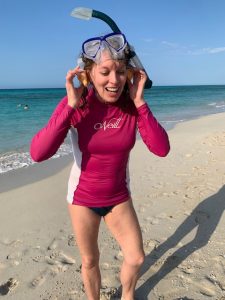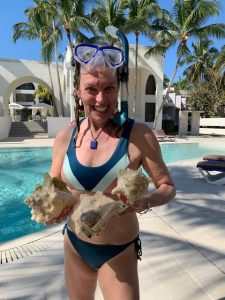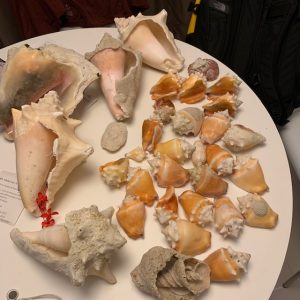Shell whisperer, AKA the shell hunter…. part two.
There’s something absolutely beautiful, captivating, and even more romantic, to spend time in Cuba at one of the resorts, under the warm sun. My husband and I have been coming to Cuba for several years and have enjoyed every single visit. With the shut down of Covid the Cuban people, especially those in the tourist industry have suffered financially emotionally and in some ways spiritually. We were very happy to be able to come to Cuba in 2022. We did see some huge differences from the years before as we travelled through Havana and spent time at the resort.
The huge long lineups of Cubans standing in the sweltering heat at the various stores to purchase their products were tenfold. For me as a Canadian, it was difficult to watch, these mothers with their small children in tow, waiting in line for a few items that most often they didn’t have enough to purchase. Clinging to their ration coupons.
When you travel to Cuba it’s good to remember, be mindful that our dollar, one Loonie in Canada doesn’t mean as much as a dollar in Cuba. With the current financial crisis due to Covid, this country is in desperate need of tourists and tourist dollars. The Cuban Pesco can be 25 to 1. However with Covid and a lack of tourism dollars the country is suffering.
During Covid, Cuba has done an excellent job getting everyone vaccinated and practically eliminating the spread of Covid. Unfortunately, the government opened up and failed to keep restrictions on travellers. Allowing Russians to come in and allowing them to not be vaccinated, not have to wear the masks, and not practice any of the Covid protocol and tragically as a result Covid again spread across this beautiful island nation. When we travel it is vital to think of it as being invited into someone’s home, being respectful of their rules and guidelines. Every single staff member at our hotel and while travelling in Havana wore their masks regularly even in the sweltering heat.
Lately, we have seen how the Russian government treats other nations and truly believes they are entitled to behave a certain way without consequences. As a Canadian, my partner and I have always respected the values and requirements of the countries we are travelling in. We don’t have to agree with everything, especially their politics. However, we do have to respect the places we visit. I look at it this way I am invited into someone’s home I will respect their property and their people.

I strongly encourage folks to travel as much as possible
because we tend to appreciate our own homes upon return. Especially with Canadian winters and those -30° days.
One of my favourite sports in Cuba is shell hunting in the water. I bring my snorkel every year spending two-thirds of my day under the water searching for beautiful shells. There’s something magical, emotionally recharging, peaceful for me diving under the water and slowly feeling the air as I exhale going deeper and deeper, in the hunt for the perfect beautiful shell. It is the thrill of the search for the little things.
On the first day, I got several shells and was thrilled with my collection. Every time I surfaced with a collection of these beautiful pink and orange shells. People on the beach could see my excitement. Not everyone likes swimming in the water. Snorkelling and swimming in the water, playing in the water is like renewing my inner child, it is a huge emotional and spiritual re-boost for my soul. Of course, everyone’s different I’m not everyone on holiday is not going to be the shell hunter the shell whisperer like me. And that’s OK. The idea is to get out there, take a dive offshore or on the beach, and just try to find something.
No one can recharge our emotional fuel cells except us. And that’s an individual choice and an individual journey. Even my husband likes to snorkel but not quite to the same extent. He does, however, value my efforts and likes to see the fun in my eyes at each new shell.
On the second day as I was looking through my snorkel floating on the surface, the warm sun soothing and warming my back, the gentle water rippling around my legs in my hands, I spotted a little white lump in the sand about 6 feet below.

I suddenly thought of Howard Carter,
(everyone knows of this brilliant man) and his search, his incredible quest in finding the lost tomb of Tutankhamen. It was a tiny end of a step that one of his helpers/guides had noticed and they began to excavate and realized it was stepped. The steps eventually led to the discovery of the most fantastic archeological discovery of the 20th century, the lost Tomb of King Tutankhamon. Of course, this magnificent was a joint effort led by Lord Carnavon which took many years and many obstacles including WW1.
You have to remember that Howard Carter had no formal university education in archeology. His family was not able to send him to university. He was fortunate to have learned everything from his mentor. Flinders Petrie was the man who is often referred to as the father of archeology when Carter was a young man working in Egypt.
Over the years working with Petrie, Carter’s skill at sketching, the training for being curious, detailed documentary analysis, photography respect for the Egyptian people and respect for history helped him find that most amazing Tomb. Recently I read the book ‘The Curse of the Mummy Uncovering Tutankhamun’s Tomb’ by Candace Fleming. It was thoroughly enjoyable and informative. I did not know that Carter never received formal training in attending university. I also was not aware how his incredible accomplishments were never honoured with awards.
And luck smiled on Carter again. Flinders Petrie, the man who invented the idea of archaeology as a science and today is knowns as “the father of archaeology” noticed the boy’s keen eye. He asked Carter to join the team. Soon the teenager was sketching by day and studying by night. From Petrie, he learns… everything! How to deal with ancient, fragile textiles; how to date a pot based on its style; how to move boulders; how to read the gorges and sand dunes; how to keep tunnels from collapsing; how to keep from being eaten alive by the sand fleas.
Most importantly, Petrie taught him the study of “unconsidered trifles.” At the time, most diggers cared only about the big finds-tomb paintings, sculptures, ore delivery. But Petrie advocated something new: “the observation of small things… The science of observation, of registration, of recording.” Nothing escaped Petrie’s eye. Unlike other Egyptologists, he took note of a single beard or amulet, corroded coins, and other fragments of the ancient Egyptian’s everyday life.
Let’s face it, my discovery of shells is in no way the same historical significance or archaeological impact, however, what made me think of Howard Carter was that tiny little white ‘nibbie’ underneath sticking out of the sand. The small piece of whatever seemed to be a stone and not worth searching further. However, I was thinking of Carter and his dog determination. It took me three tries before I finally dug up the most beautiful shell that weighed about 3 pounds. The idea is when we are curious we open our minds to new adventures. When we are curious, we are looking at life, people, events, and experiences through a lens of compassion and non-judgment. There seem to be life lessons everywhere we are willing to look.
It truly is amazing what we can find. Over the next two days, I found over 30 beautiful orange-pink blueish shells as I snorkelled for hours. Plus was blessed to find four huge shells. My husband found his own but was not able to reach it so we got it together. He pointed to the spot and I swam down a few times to retrieve his treasure. Teamwork at its best! Now not being greedy I was very happy to share with people on the beach you never had the opportunity to snorkel, may not like the water, are fearful of the sea, and wouldn’t take the time to search and discover.
I look at it this way I was building bridges of understanding and compassion with everyone I met by sharing my shells. I met some truly awesome folks from around the world. People on the beach would watch as I would go in hour after hour, and come out with my hands filled with shells. Sharing my adventures and some shells with people from Germany, Croatia, England, Poland, Canadians originally from Ukraine, England and Canada. Literally a United Nations on the beach.
How does the Shell Whisperer part 2 build bridges of understanding? With curiosity, listening to others, being nonjudgemental, and sharing her shells. Whatever you do in life, the idea is to be willing to try new things, new experiences for yourself, and share with others. Life is truly a gift. Searching for the shells, diving deep into the water and the final success of having that little colourful shell was a perfect self-care recharge of my own emotional fuel cells.

